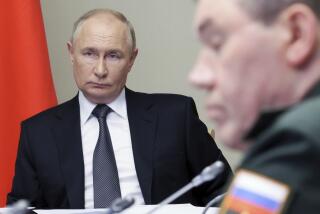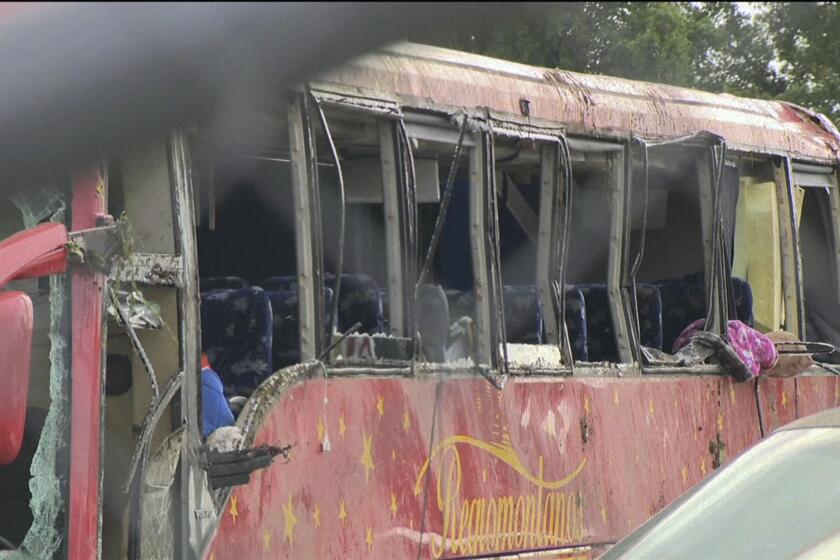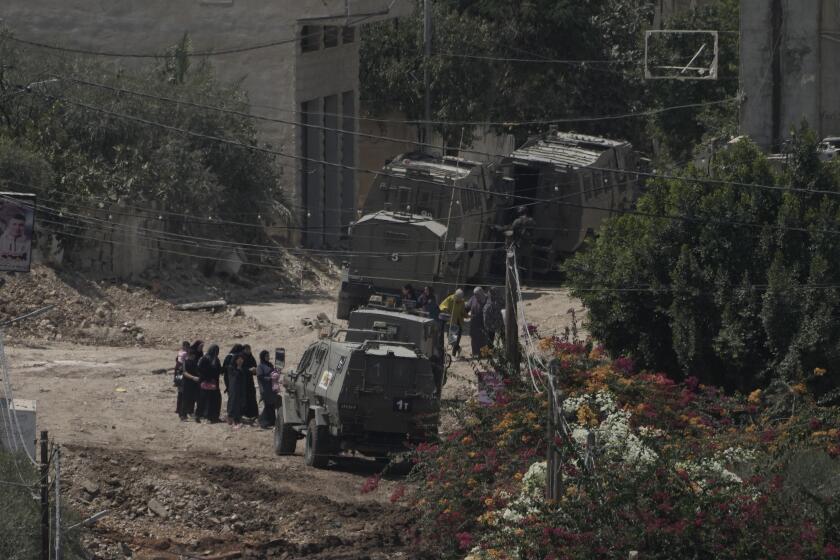Iraqis Vow Revenge; Other Arabs Outraged
Iraq vowed “severe revenge” Thursday for the U.S. air strike that reportedly left hundreds of civilians dead in a Baghdad structure, as outrage over the attack spread to the streets of neighboring Jordan and elsewhere in the Arab world.
Chanting “Death to America!” and “Saddam, Saddam, use the chemicals, Saddam!” hundreds of demonstrators splattered the wall of the U.S. Embassy in Amman with red paint and planted Iraqi flags outside it during a demonstration that began before noon and lasted well into the night.
Many Amman residents were clearly furious over television broadcasts showing mangled bodies being carried Wednesday from the Baghdad facility that the Iraqi government called a civilian bomb shelter but the U.S. government called a military command-and-control bunker. Throughout the Jordanian capital, most foreigners who ventured out were treated with disdain and anger, and at least one was attacked--a German student who was stabbed in the chest and wounded by a Jordanian.
“Never mind, let them all die!” screamed a weeping Widad Abdel-Hamid Nouri, an Iraqi woman with relatives living in Baghdad’s Amariya neighborhood, where the bombing occurred, as she joined more than 1,000 demonstrators who took turns chanting protests for hours outside the U.S. Embassy here.
“We Iraqis are known for sacrifice,” she said. “We are all willing to die so Saddam will live.”
In the Iraqi capital itself, the government said Thursday that 288 bodies had been recovered from the bombed structure.
Dr. Faiq Bakr, the director of the government mortuary, said 194 bodies, including 91 children, 48 women and 55 men, have been identified by sex, according a Reuters report. The other 94 bodies brought from what the doctor called the Amariya shelter were charred beyond recognition, Reuters quoted him as saying.
During the hours immediately after the bombing, Iraqi officials on the scene estimated that there were 500 dead.
“The rescue operation continues,” Baghdad Radio said Thursday, “and we will give you the full results of this crime in a subsequent communique.”
For more than a month, not a day has passed without allied air strikes on Baghdad. Each time, residents dash for one of the 22 sites officially designated as civilian shelters. The Amariya structure was considered one of those, with a sign outside saying “Shelter” in Arabic and English.
“Iraq will severely revenge every drop of its martyrs’ blood,” the Baghdad Radio broadcast declared, quoting a spokesman from the Iraqi armed forces. “This ugly crime will not pass without the strongest retaliation from our people and armed forces.”
The spokesman did not specify the form of the retaliation, but the broadcast warned of “devastating surprises” and added that final victory for the Iraqi people was only a few days away.
After what it called “four weeks of fierce, large-scale aerial attacks, the leaders of the aggression have reached the brink of despair and frustration. . . ,” the radio said.
“We tell (Defense Secretary Dick) Cheney that Iraq’s surprises will continue, and we promise him that these surprises will multiply and grow. They will be devastating surprises . . . hidden surprises that will be decisive in the battle equation.”
Such expressions have usually been interpreted as threats that Iraq would use some of the chemical and biological weapons that it is known to possess.
And as the crowds in the streets of Amman demanded that Iraqi President Saddam Hussein use such weapons, it was clear that the mood in Jordan’s capital, a city already sympathetic toward Iraq, had become angrier and more passionate than at any time since the allied assault on Iraq began Jan. 17.
In an explosion of fury outside the U.S. Embassy, well-dressed women threw their high-heeled shoes at the embassy gate--a conspicuous insult in the Arab world--and children carried signs declaring, “Go Away U.S.A.” and “Murderers and Killers of Women and Children.”
“In the old times we had some faith in the Americans,” said another Iraqi woman in the crowd, Nour Han Najm. “But now they are just like dogs.”
Throughout the day, the demonstrators moved back and forth between the 100 yards separating the U.S. Embassy and the Egyptian Embassy, where they frequently shouted “(Hosni) Mubarak is a traitor! Mubarak is a donkey!”
On the official level, Jordan’s reaction to the news from Baghdad was equally prompt. Wednesday night, the government and King Hussein’s palace ordered three days of mourning for the victims of the air attack and lowered the flags on government buildings.
The king sent a sharply worded message to the U.N. Security Council, demanding a cease-fire in the Gulf War and the dispatch of a U.N. fact-finding team to Iraq to judge whether the allied air attacks violated international laws.
“The bombardment of a civilian shelter in Baghdad, resulting in the death of so many innocents, is a tragic reminder that Security Council Resolution 678, interpreted by some as carte blanche to wage a war of systematic destruction against Iraq, is a case of authority without accountability,” the letter said.
Similar waves of popular anger were reported Thursday elsewhere in the Arab world, particularly in Yemen and Algeria, whose governments said the Western forces opposing Iraq are engaged in the “wholesale destruction of civilian neighborhoods” in Iraq.
However, the shock and rage ignited by the Baghdad air raid did not immediately translate into the revolutionary mass protests and rebellions that Iraqi leaders had called for throughout the Arab, Islamic and Third Worlds this week.
“Demonstrations and rallies should not stop at extending a memorandum of protest or burning effigies,” declared Saddam Hussein’s top deputy, Taha Yassin Ramadan, two days before the Wednesday bombing in Baghdad. “Burn whatever is related to forces of aggression on the installations of the countries that are taking part in the aggression.”
There was not a single street demonstration reported Thursday, for example, in Egypt or Syria, the two key Arab supporters of the coalition. Both the Cairo and Damascus governments keep a tight lid on protests; in Syria, none has been openly staged in years.
In Damascus, the government radio said that Saddam Hussein is responsible for the bombing deaths in Baghdad. “He who holds the decision to stop the bloodletting with one word, and refrains from saying that word, is responsible for the spilling of every extra drop of Iraqi blood,” Damascus Radio said.
“The recklessness, arrogance and stubborness of the ruler of Baghdad prevented the avoiding of this catastrophe,” it added.
In Morocco, the third non-Persian Gulf Arab state to send troops to Saudi Arabia, state television said Wednesday night that the government of King Hassan II “sympathizes with Iraq in its current predicament, as was shown by solidarity with and emergency (medical) aid to the Iraqi people.” But the broadcast rejected an Iraqi demand that Hassan withdraw his 1,300 troops from the coalition forces.
The largest anti-war protests of the conflict--estimated at more than 300,000 marchers--took place in Rabat, the Moroccan capital, two weeks ago.
The Egyptian government, clearly embarrassed by the civilian deaths in Baghdad, sought to play down their likely impact on public opinion. But opposition groups bitterly denounced the air attack, and diplomats said they expect it will have a profound effect in accelerating anti-war sentiments in Egypt, where a still-strong anti-Iraq mood has been tempered by rising alarm over the destruction being visited by allied bombers on a fellow Arab nation.
Speaking to reporters as he toured economic facilities in Cairo with visiting Libyan leader Moammar Kadafi, Egyptian President Mubarak expressed “regret” for the deaths but said Iraq bore the blame for them. “They (the Iraqis) hide tanks in schools, and they are using their own citizens now as human shields,” he said.
Kadafi did not comment on the attack.
But the Muslim Brotherhood, the largest and most respected Islamic opposition group in Egypt, issued a statement denouncing the “murder” of Iraqi civilians and calling for an immediate end to “this damned war.”
The “Zionist allies of America, England and France said this was a military site . . . but their statements have ben proven to be a lie,” the Brotherhood said.
The shifting mood in Egypt was illustrated by a conversation between two Egyptians overheard in a Cairo bookstore.
“The Americans did this to terrify the Iraqis,” the proprietor told his customer.
“The Americans do not want any strong Arab powers in the region,” the customer replied. “They are destroying Iraq now, but in five years they will be bombing Egypt.”
On Thursday, Palestinians in the Israeli-occupied West Bank began a three-day general strike in sympathy with the Baghdad victims, a solidarity tactic often employed in the territories. Most Palestinians believe that the now-besieged military power of Saddam Hussein is their best weapon in the struggle for an independent state.
In Tunisia, a day of mourning was declared and flags were lowered to half-staff. The state radio played patriotic music throughout the day, interspersed with commentaries opposing the war.
But events have yet to touch off the mass protests that the Iraqi leadership now apparently sees as its only way to crack the coalition. In broadcast appeals to what it calls the Arab masses, Iraq has increasingly sought to reach out for popular support over the heads of opposing governments.
Most Middle East analysts agree that sympathy and admiration for Iraq and Hussein, the Arab strongman who stood up to the West, is widespread except in the Gulf states and perhaps in Egypt. But the Arab masses, the lower classes who rallied to leaders such as Gamal Abdel Nasser in the 1950s and 1960s, are now more concerned with national policies than with intra-Arab politics.
Hussein’s challenge to take on the West and Israel is not a priority to Arab workers scratching to get by in countries where the economic split between ruling elite and the poor has widened over the past decade.
And on the governmental level, even pro-Iraqi regimes such as Yemen, which might be expected to come to Baghdad’s aid, are sitting out the struggle rather than tangling with the massive weaponry of the American-led allies.
“We Arabs are angry,” said a Palestinian journalist in Amman, “but we’re not suicidal.”
Times staff writer Michael Ross, in Cairo, contributed to this story.
More to Read
Sign up for Essential California
The most important California stories and recommendations in your inbox every morning.
You may occasionally receive promotional content from the Los Angeles Times.






